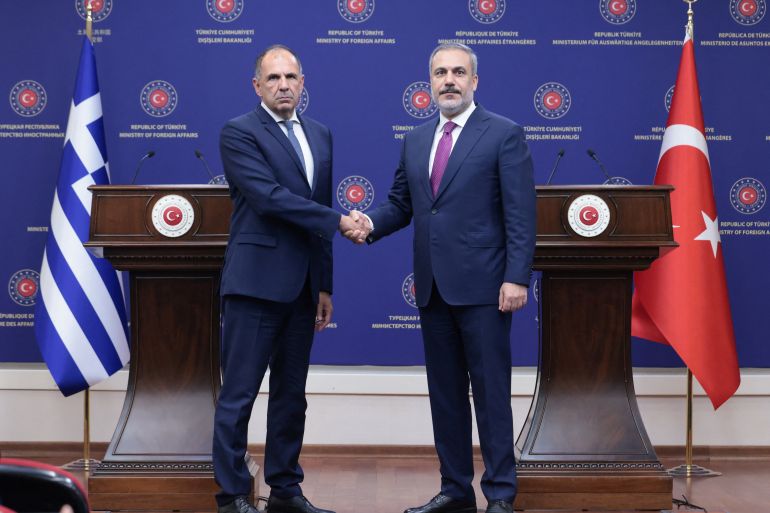Ministerial meeting heralds warmer relations between Greece and Turkey
Foreign ministers meet in Ankara saying they seek to reach ‘common ground’ to resolve decades-old disputes.

The foreign ministers of Greece and Turkey have agreed to revive high-level contacts between their countries and seek “new approaches” to problems as part of an effort to improve ties between the two NATO neighbours, who have been at loggerheads over a string of decades-old disputes.
Discussions between Greece’s Giorgos Gerapetritis and Turkey’s Hakan Fidan on Tuesday were held in a relatively friendly climate triggered by Greece sending assistance to Turkey following a devastating earthquake earlier this year and Turkey offering condolences after a deadly train accident in Greece.
Keep reading
list of 3 itemsFacing tragedy, Turkey mends ties with Greece and Armenia
Turkey’s been busy at NATO: Sweden’s bid, F-16s and war mediation
“We have entered a new and positive period in our relations with Greece,” Fidan told journalists at the end of their talks. “We reiterated our belief that our problems will be resolved through a constructive dialogue between the two neighbours and allies.”
The meeting came as Ankara, in the throes of an economic downturn, is seeking a reset of its often-troubled relations with Western nations. It follows a rare meeting between President Recep Tayyip Erdogan and Greek Prime Minister Kyriakos Mitsotakis on the sidelines of a NATO summit in Lithuania in July.
According to a “roadmap” unveiled by the two ministers, Mitsotakis and Erdogan would meet again on the sidelines of the United Nations General Assembly in New York on September 18, followed by a meeting of high-level officials in October.
The sides would also hold talks on a series of confidence-building measures and revive a stalled high-level cooperation council meeting.
“We don’t have our heads in the clouds. We know that the distances that developed with the passage of time and the passions passed on from generation to generation cannot be erased with one stroke,” Gerapetritis said.
“But we have the disposition and the will to invest in candour and mutual understanding so as to seek common ground, break with established opinions and, where there are disagreements, at least not have them lead to crises,” he continued.
Greece and Turkey are at odds over territorial claims in the Aegean Sea, energy exploration rights in the eastern Mediterranean and the division of Cyprus, among other issues.
“We evaluated our problems concerning the Aegean and the eastern Mediterranean in a comprehensive manner,” Fidan said. “We agreed on bringing new approaches to the solution of the problems.”
Relations have remained tense between the two NATO allies after they nearly came to blows two years ago.
The Greek and Turkish navies shadowed each other in the Aegean and the Eastern Mediterranean for a whole summer after Turkey sent a survey ship to look for undersea oil and gas in waters Greece claims as its jurisdiction under international law.
Turkey has accused Greece of deploying troops on Aegean islands close to the Turkish coast in violation of treaties. Greece says it needs to defend the islands against a potential attack from Turkey, noting Turkey has a sizeable military force on the western Turkish coast.
Turkish officials said continued militarisation of the islands could lead to Turkey questioning their ownership while Erdogan went as far as to threaten to send missiles to Athens.
Last year, Erdogan had pledged never to talk to Mitsotakis, furious at the Greek leader, who during a visit to the United States, called on Washington not to sell F-16 fighter jets to Turkey.
But relations between the two countries improved when Greece became one of the first to send rescue workers to Turkey after devastating earthquakes in February killed 50,000 people.